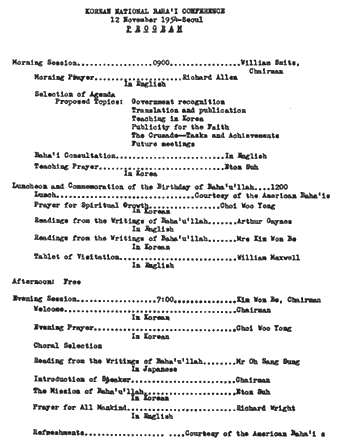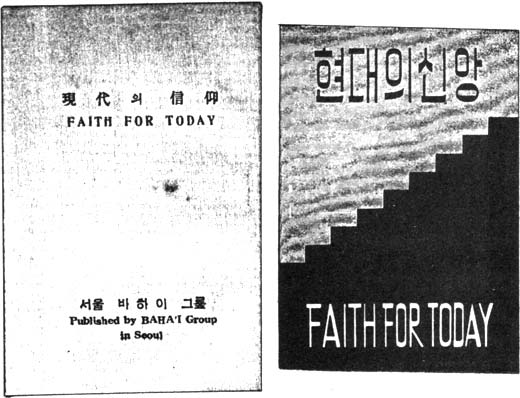
|
Raising the Banner in Korea:
An Early Bahá'í History
by Barbara R. Sims
 |
chapter 4 | start page | single page | chapter 6 |  |
Chapter 5
5. The First Public Meeting in the Post-War Years
The first public meeting in Korea, since that one years before in 1921 at which Miss Alexander spoke, was held at the Seoul YMCA, on November 12, 1954 and commemorated the Birth of Bahá'u'lláh. It was an all-day meeting with three sessions: in the morning, afternoon and evening. The Bahá'ís who conducted the day's meetings were Mr. Maxwell; Mr. Smits; Mr. Suh Eton, who was an instructor at a language institute; Arthur Gaynes, an American serviceman friend of Mr. Maxwell who had become a Bahá'í in Korea that year; Mr. Choi Woo Yong; Mr. Oh Sang Sun, who was not a registered Bahá'í but friendly to the Faith; Richard Wright and Richard Allen, American servicemen who were Bahá'ís; and Capt. and Mrs. Kim Won Be, new Bahá'ís who were friends of Mr. Maxwell. In the evening session there were nine Bahá'ís, five Americans and four Koreans, and eight non-Bahá'ís to listen to Mr. Suh Eton speak.This first meeting was considered to have been a success and at least one person declared his belief in Bahá'u'lláh.
The Bahá'ís sent a cable to the Guardian informing him of their historic meeting, and listing the names of the Bahá'ís so far in Seoul. The Guardian answered via the National Spiritual Assembly of the Bahá'ís of the United States, "Rejoice news assure loving prayers, Shoghi."
The next month the Bahá'ís of Seoul decided to have a "Christmas" meeting which was held in a private room of a Chinese restaurant. The program was entirely in Korean with Capt. Kim Won Be and Mr. Kim Chang-zin speaking. It was attended by three adult Korean believers, three students and three U.S. servicemen Bahá'ís.
The lack of Bahá'í literature in Korean was a major problem in those early days. At that time most Koreans could read Japanese so they were provided with Bahá'í pamphlets from Japan. But even so, there was only a small selection. One of the priorities of the small community was to print a pamphlet in Korean. This goal was accomplished in January 1955
with the printing of 1000 copies of an introductory pamphlet. It was translated from Japanese the year before by Capt. Kim Won Be and reviewed by Mr. Choi Woo Yong and Mr. Oh Sang Sun, who was a friend of the Faith. A copy of the new pamphlet was sent to the Guardian and a letter written on his behalf reported that the Guardian was "truly proud" of

click for larger image
The program of the first post-war public meeting in Korea, November 12, 1954 on the occasion of the Commemoration of the Birth of Bahá'u'lláh. It was an all-day meeting with three sessions; the first endeavor in which most of the Bahá'ís in Korea participated.
their achievement. Mr. Maxwell and Mr. Smits sent 100 copies of the pamphlet to then Auxiliary Board Member Miss Alexander who was in Japan. They wrote to her, "The pamphlets were unveiled at the regular fireside where twenty-one people were present, including three officials from the firm which had printed them, one of whom declared his intention of becoming a Bahá'í." The pamphlet was printed again in 1960, revised and with a new cover, 2000 copies. The community had also mimeographed twenty copies of prayers in Korean with the intention of eventually printing them professionally.
The community had regular Bahá'í activities and by February 1955 there were six adult Korean Bahá'ís and two youth.
On April 1, 1955 the small group in Seoul was so happy when the ninth Korean declared her Faith -- Miss Hong Hie Sook, the third woman to do so -- that they sent a cable to Shoghi Effendi informing him of this good news. He answered "Delighted. Praying success Seoul friends, Shoghi."

The first Bahá'í pamphlet to be printed, 1000 copies, in Korean, 1955 (left). It was translated from Japanese by Capt. Kim Wong Be and worked on by a committee in Seoul. A copy was sent to Shoghi Effendi and a letter written on his behalf reported that he was "truly proud" of their achievement.In 1960 the pamphlet was reprinted with a new design (right).
 |
chapter 4 | start page | single page | chapter 6 |  |
|
|